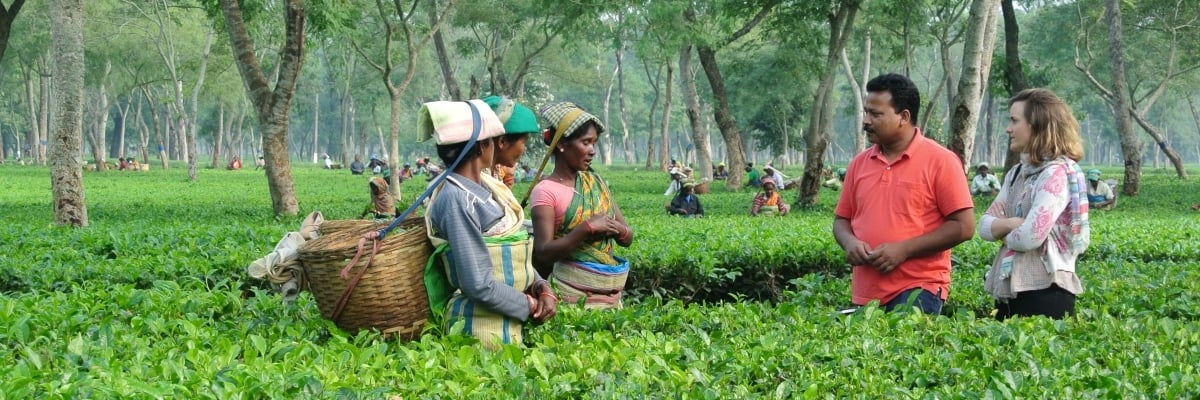As we enter the second week of Fairtrade Fortnight, it’s a time to celebrate our Fairtrade products and reflect on our hard work building strong relationships with our producers and working on programmes such as empowering women in the supply chain. This year, Fairtrade marks 25 years since it launched in the UK; a pioneering standard, which ensures farmers are paid a fair price and a premium to invest in their communities. At M&S, our goal is to be a leader for sustainable production, while ensuring our customers know they can trust us for quality products. All coffee and tea sold at M&S is Fairtrade and in addition to Fairtrade we’re committed to investing in programmes to improve the wellbeing of our producers and protect the environment.
After introducing our first Fairtrade product in 2004, today we have an extensive range on offer including wine, sugar, jam, single origin chocolate bars and bananas, in addition to our tea and coffee. Through regular visits to our Fairtrade producers around the world, I’ve been fortunate to meet members of the cooperatives and workers in Fairtrade estates and see first-hand the difference that Fairtrade can make. We are proud to have built strong relationships with many of our Fairtrade growers and we’re continuing to support them by investing in projects such as rolling out our partnership with Emerging Leaders or investing in a collaborative capacity building project in Peru.
At M&S, we’re also committed to being transparent about our supply chain and building trust among our customers and stakeholders. That’s why we launched our Interactive Supply Chain Map in 2016, which lists the locations of all M&S supplier factories and was extended to include raw materials. So far, we’ve published information about the farmers that produce M&S beef, fresh milk, wild and farmed seafood and details of where the wool comes from that makes M&S products. We aim to add details of further key raw materials on an ongoing basis. And in light of Fairtrade Fortnight, we wanted to extend the coverage of our map to our tea and coffee supply chains and celebrate the fantastic producers we work with. The map shows where all our tea and coffee producers are located, as well as key details such as how long we’ve been working with them, the number of workers or cooperative members and where we can, we include the percentage of females who are cooperative members. It’s also our way of responding to a recent Traidcraft campaign, which called on businesses to disclose their tea supply chains. We plan to disclose similar information about all our Fairtrade producers during 2019.
What does the interactive map show us? As well as information about all the incredible tea and coffee producers we work with, it shows some interesting facts about our supply chain. We source from 135 producers across 19 countries, including 36 tea estates and 102 cooperatives with more than 600,000 cooperative members (or smallholder farmers). Last year we contributed more than £1.3m in Fairtrade Premiums for the tea and coffee producers to invest in their communities. Personally, the most compelling statistic is the percentage of women that are formal members of the cooperatives, which isn’t always tracked and shows why transparency is essential to create change. Whilst we don’t yet have gender representation data for all our producers, according to what we do have the average proportion of female owners is 23% – a seemingly higher average compared to other sector co-operatives. It is so important that we continue tracking this figure and measuring positive change.
We know that more needs to be done to champion female workers and growers in our supply chain, because they play a crucial role in the farming process – all while they often don’t have legal ownership of their farms or receive much or any of the income. We’ve been running a project in Peru aiming to tackle this issue, where the cooperatives involved witnessed an increase in female membership and the number of women in leadership positions grew from only 3 to 31, while we’ve also recently partnered with the DFID Work Opportunity for Women programme to try and remove the barriers for women in cooperatives in Kenya.
Being transparent allows us to take a fresh look at our supply chains and presents new opportunities to gain further insights into them. For example, we’ve found out crucial information about our tea and coffee supply chains such as data on gender representation, other certifications held, geography and so on. But there is still more work to be done and we will continue collaborating with our suppliers to improve the completeness of our data over the coming months and update our supplier map accordingly.
During Fairtrade Fortnight, it’s an opportunity to celebrate some of the women working with Fairtrade. I’ve been fortunate enough to meet a whole host of wonderful women in the supply chain, including Esperanza from our coffee supplier Pangoa in Peru, Mary from our tea supplier, Iriaini in Kenya and Agnes from Cann Cocoa cooperative in Ivory Coast. These women are the future of their organisations and industries, breaking through the traditional barriers and leading their cooperatives and organisations. So, every time we buy a Fairtrade product, we should take a moment to celebrate the hard work, determination and dedication that goes into every sip or bite of M&S’s delicious products.

Editor’s Note:
This article was previously featured on Marks and Spencer’s blog and is reproduced with permission











